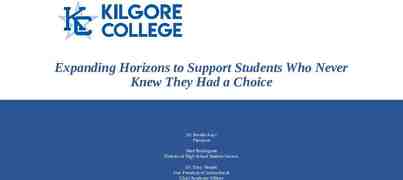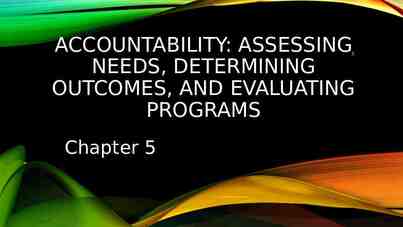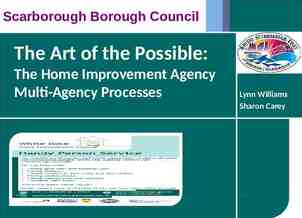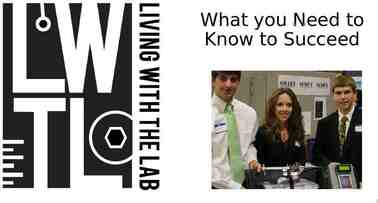Effective Presentations Skills Employee Development Center June
32 Slides422.00 KB

Effective Presentations Skills Employee Development Center June 26, 2003 Chris Carter

Agenda Introduction Planning Your Presentation The Presentation Sequence Creating Effective Visual Aids resentation Techniques Practice

“Great speakers aren’t born, they are trained.” Presenting is a Skill Developed through experience and training. Source: http://www.hplearningcenter.com

#1 Fear Feared More Than Death! THE FACTS: Shaky hands, blushing cheeks, memory loss, nausea, and knocking knees NORMAL!

Causes of the Anxiety Fear of the Unknown OR Loss of Control Fight or Flight Mode No Backup Plan No Enthusiasm For Subject Focus of Attention

Definitions Presentation “Something set forth to an audience for the attention of the mind “ Effective “ producing a desired result” Source: http://www.merriam-webster.com

Effective Presentations Control Anxiety – Don’t Fight It Audience Centered Accomplishes Objective Fun For Audience Fun For You Conducted Within Time Frame

Why Give A Presentation? Two Main Purposes 1. Inform 2. Persuade 3. Educate

Part 2: Planning Your Presentation

Planning Your Presentation 1. Determine Purpose 2. Assess Your Audience “Success depends on your ability to reach your audience.” Size Demographics Knowledge Level Motivation

Planning A Presentation 3. Plan Space Number of Seats Seating Arrangement Audio/Visual Equipment Distracters 4. What Day and Time? Any Day! Morning

More Planning 5. Organization Determine Main Points (2-5) Evidence Transitions Prepare Outline

Organizing Your Presentation Organizational Patterns Topical Chronological Problem/Solution Cause/Effect

Presentation Outline Keyword Reminders Conversational Flow Flexibility More Responsive to Audience

Part 3: The Presentation Sequence

#1: Build Rapport relation marked by harmony or affinity Start Before You Begin Audience members who trust you and feel that you care Mingle; Learn Names Opportunity to reinforce or correct audience assessment Good First Impression People Listen To People They Like

#2: Opening Your Presentation Introduce Yourself – Why Should They Listen Get Attention, Build More Rapport, Introduce Topic Humor Short Story Starling Statistic Make Audience Think Invite Participation Get Audience Response

#2 Completing the Opening Clearly Defining Topic If Informative If Persuasive Clear parameters for content within time What’s the problem Who cares What’s the solution Overview

#3: Presenting Main Points (Solution) Main Point-Transition-Main PointTransition-MainPoint . Supporting Evidence Examples Feedback & Questions From Audience Attention to, and Focus on, Audience (Listening)

#4: Concluding Your Presentation Goal Inform audience that you’re about to close Summarize main points Something to remember or call-to-action Answer questions “Tell ’em What You Told ‘em.”

Part 4: Effective Presentation Techniques

Presentation Style 3 Elements 1. Vocal Techniques Loudness Pitch Rate Pause Deviations From the Norm for Emphasis

Presentation Style (con’t) 3 Elements 2. Body Language Eye Contact, Gestures, Posture 3. Use of Space Can Everyone See You? Movement

Common Problems Verbal fillers “Um”, “uh”, “like” Any unrelated word or phrase Swaying, rocking, and pacing Hands in pockets Lip smacking Fidgeting Failure to be audience-centered

5 Presentation Tips 1. Smile 2. Breathe 3. Water 4. Notes 5. Finish On Or Under Time

Part 5: Creating Effective Visual Aids

Visual Aids Enhance Understanding Add Variety Support Claims Lasting Impact Used Poorly A Distraction Ineffective Presentation
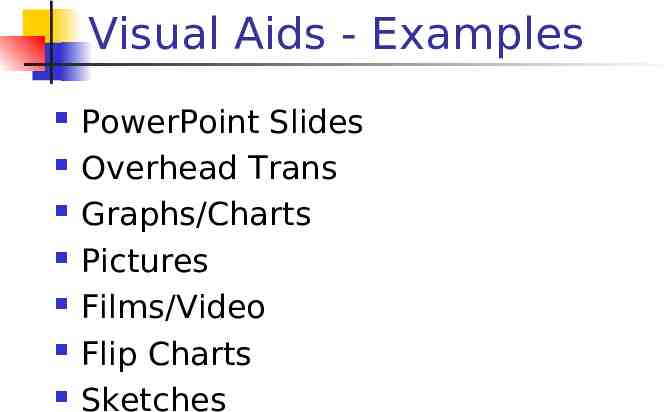
Visual Aids - Examples PowerPoint Slides Overhead Trans Graphs/Charts Pictures Films/Video Flip Charts Sketches

Visual Aids Should Supplement presentation Outline of main points Serve audience’s needs, not speaker’s Simple and clear

Main Point 1: The Purpose of Using Visual Aids Visual aids support your ideas and improve audience comprehension of your presentation Visual aids add variety to your presentation by giving the audience a break from listening and letting the see something Visual aids help illustrate complex ideas or concepts and are helpful in reinforcing your ideas
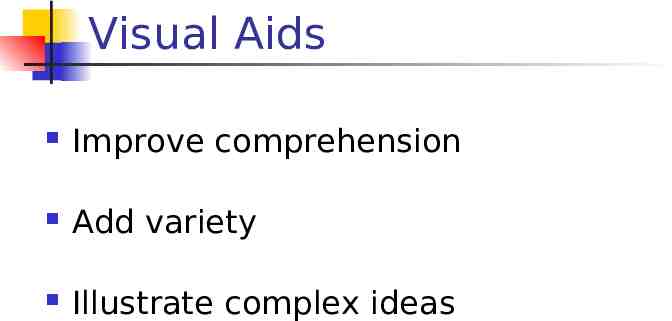
Visual Aids Improve comprehension Add variety Illustrate complex ideas
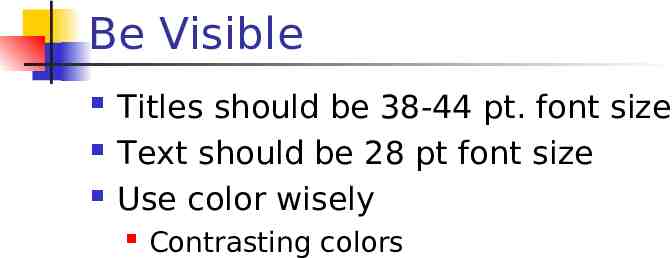
Be Visible Titles should be 38-44 pt. font size Text should be 28 pt font size Use color wisely Contrasting colors

